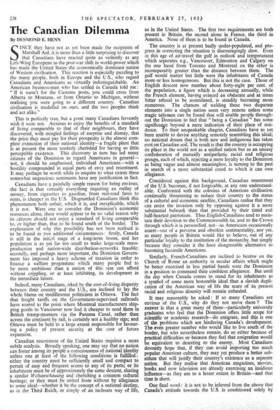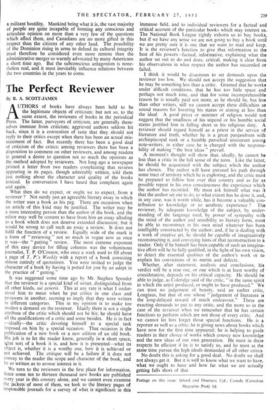The Canadian Dilemma
By DESMOND E. HENN SINCE they have not as yet been made the recipients of Marshall Aid, it is more than a little surprising to discover that Canadians have reacted quite as violently as any Left-Wing European to the post-war shift in world-power which has made the United States the economically dominant nation of Western civilisation. This reaction is especially puzzling to the many people, both in Europe and the U.S., who regard Canadians and Americans as virtually indistinguishable. An American business-man who has settled in Canada told me : " If it wasn't for the Customs posts, you could cross from Alberta to Montana, or from Ontario to Michigan, without realising you were going to a different country. Canadian civilisation is modelled on ours, and the two peoples think and act alike."
This is perfectly true, but a great many Canadians fervently wish it were not. Anxious to enjoy the benefits of a standard of living comparable to that of their neighbours, they have discovered, with mingled feelings of surprise and dismay, that the price they must pay for their prosperity is the almost com- plete extinction of their national identity—a fragile plant that is at present the more tenderly cherished for having so little perceptible existence. This discovery in turn has led many citizens of the Dominion to regard Americans in general— not, it should be emphasised, individual Americans—with a hostility compounded in equal parts of envy and resentment. It may perhaps be worth while to enquire to what extent these somewhat ungracious sentiments have any justification in fact.
Canadians have a painfully simple reason for being envious; the fact is that virtually everything requiring an outlay of money, from cigarettes to gasoline, from rail-road fares to rents, is cheaper in the U.S. Disgruntled Canadians think this phenomenon both unfair, which it is, and inexplicable, which it is not. Were one to consider the Dominion's economic resources alone, there would appear to be no valid reason why its citizens should not enjoy a standard of living comparable to, or higher than, that to be found south of the border. The explanation of why this possibility has not been realised is to be found in two additional circumstances : firstly, Canada is still in the initial stage of a long-term boom, and her population is as yet far too small to make large-scale mass- production and nation-wide distribution-networks feasible; secondly, and perhaps more important, the Dominion Govern- ment has imposed a heavy scheme of taxation in order to finance a welfare programme which many people feel to be more ambitious than a nation of this size can afford without crippling, or at least inhibiting, its development in the immediate future.
Indeed, many Canadians, irked by the cost-of-living disparity between their country and the U.S., are inclined to lay the whole blame on meddlesome politicians in Ottawa. The fact that freight tariffs on the Government-supervised railroads have soared to the point where Montreal manufacturers ship- ping goods to Vancouver now find it cheaper to send them in British tramp-steamers via the Panama Canal, rather than across the continent by rail, is certainly not a healthy sign; and Ottawa must be held to a large extent responsible for favour- ing a policy of present security at the cost of future expansion.
Canadian resentment of the United States requires a more subtle analysis. Broadly speaking, one may say that no nation can foster among its people a consciousness of national identity unless one at least of the following conditions is fulfilled: either the country must be sufficiently small and compact to permit of easy and frequent access to any of its parts; or its Inhabitants must be of approximately the same descent, sharing a similar Weltanschauung and cherishing a common cultural heritage; or they must be united from without by allegiance to some ideal—whether it be the concept of a national destiny, as in the Third Reich, or simply of an inchoate way of life, as in the United States. The first two requirements are both present in Britain, the second alone in France, the third in America. None of them is to be found in Canada.
The country is at present badly under-populated, and pro- gress in correcting the situation is discouragingly slow. Even in this age of air-travel the gulf in outlook and temperament which separates e.g., Vancouver, Edmonton and Calgary on the one hand from Toronto and Montreal on the other is incomparably greater than the distance between them. The gulf would matter but little were the inhabitants of Canada more or less homogeneous. But this is not the case. Those of English descent now number about forty-eight per cent. of the population, a figure which is decreasing annually, while the French element, having evinced an obdurate and at times bitter refusal to be assimilated, is steadily becoming more numerous. The chances of welding these two disparate elements into a single nation seem very remote unless some magic talisman can be found that will enable people through- out the Dominion to feel that " being a Canadian " has some significance beyond a mere indication of their place of resi- dence. To their unspeakable chagrin, Canadians have as yet been unable to devise anything remotely resembling this ideal; no national dream that is both new and indigenous has taken root on Canadian soil. The result is that the country is occupying its place in the world not as a unified nation but as an uneasy confederation of mutually antipathetic racial and religious groups, each of which, rejecting a mere loyalty to the Dominion as being vague and almost meaningless, is turning to the past in search of a more substantial creed to which it can owe allegiance.
Considered against this background, Canadian resentment of the U.S. becomes, if not forgivable, at any rate understand- able. Confronted with the colos'sus of American civilisation continually threatening to reduce their country to the status of a cultural and economic satellite, Canadians realise that they can resist the invasion only by opposing against it a more substantial bulwark than that provided by their timid and half-hearted patriotism. Thus English-Canadians tend to main- tain their devotion to the Commonwealth tie, and to the Crown through which it is personified, not—as Americans occasionally assert—out of a perverse and obsolete sentimentality, nor yet, as many people in Britain would like to believe, but of any particular loyalty to the institution of the monarchy, but simply because they consider it the least disagreeable alternative to becoming facsimile Americans.
Similarly, French-Canadians are inclined to bestow on the Church of Rome an authority in secular affairs which might be better exercised in less partial hands were the Dominion in a position to command their confident allegiance. But until the day when Canada comes to stand for its inhabitants as a symbol of some more honorable ideal than a slavish dupli- cation of the American way of life the scars of its present racial and religious disunity will remain unhealed.
It may reasonably be asked : If so many Canadians are envious of the U.S., why do they not move there ? The answer is that a great many of them—particularly university graduates who feel that the Dominion offers little scope for scientific or academic research—do emigrate, and this is one of the problems which are hindering Canada's development. The even greater number who would like to live south of the border, but who nevertheless remain, do so either because of practical difficulties or because they feel that emigration would be equivalent to deserting to the enemy. Most Canadians devoutly hope that, if they can avoid importing too much popular American culture, they may yet produce a better sub- stitute that will justify their country's existence as a separate nation. But they realise that American magazines, movies. books and now television are already exercising an insidious influence—as they are to a lesser extent in Britain—and that time is short.
One final word : it is not to be inferred from the above that Canada's attitude towards the U.S. is conditioned solely by
a militant hostility. Mankind being what it is, the vast majority of people are quite incapable of forming any conscious and articulate opinion on more than a very few of the questions which affect them, and Canadians are no more gifted in this respect than the citizens of any other land. The possibility of the Dominion rising in arms to defend its cultural integrity must therefore be considered even more remote than the administrative merger so warmly advocated by many Americans a short time ago. But the subconscious antagonism is none- theless real, and it must inevitably influence relations between the two countries in the years to come.



































 Previous page
Previous page